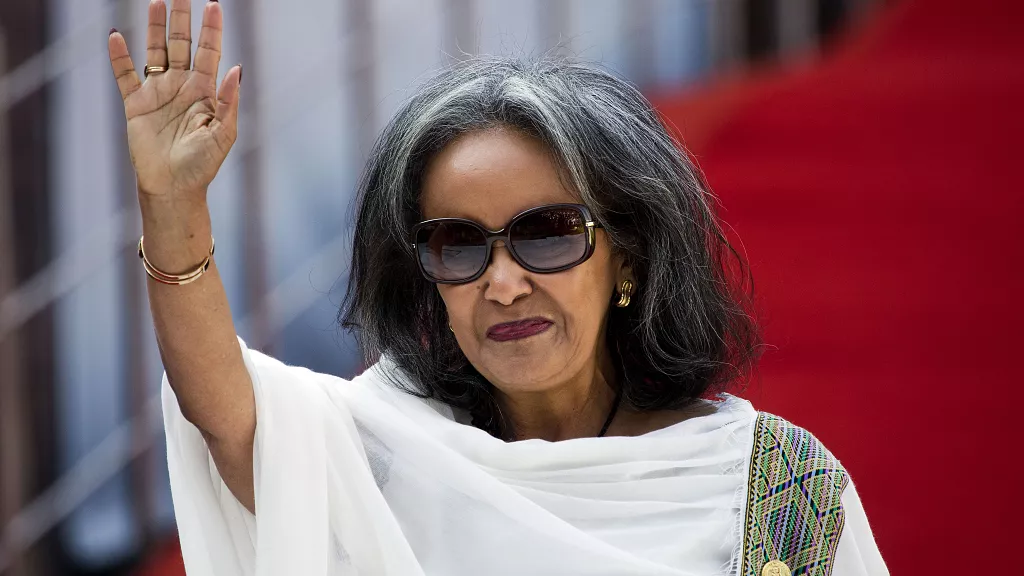
President Sahle-Work Zewde of Ethiopia steps down following disagreement with PM
With her departure, Tanzania becomes the only nation in Africa to have a female head of state.
Sahle-Work Zewde, the president of Ethiopia, stepped down from her position on Monday, following weeks of conjecture.
Taye Atske Selassie, a former UN envoy who was named foreign minister earlier this year, was voted in as the new president of Ethiopia by the Federal House of People’s Representatives.
Sahle-Work, a renowned diplomat, assumed the presidency in 2018 after holding a number of positions, including head of the UN office in Nairobi. In a brief ceremony in Addis Ababa, she immediately gave the new President her powers.
However, there had been speculation that she might soon step down. She had fueled rumors of her resignation on Saturday by sharing a mysterious message on X that quoted the melancholic and hopeful song “Silence is My Answer” by Mahmoud Ahmed.
With her departure, Tanzania becomes the only nation in Africa to have a female head of state. However, in Ethiopia, the prime minister often holds the majority of the executive branch’s authority, making the presidency ceremonial.
Taye Atske Selassie was chosen as her successor by the Ethiopian parliament on Monday. Although his selection signifies a change in Ethiopia’s leadership, it also draws attention to the continued difficulties facing women in positions of political leadership throughout the continent.
The legacy of Sahle-Work
In October 2018, Sahle-Work, a nation with a turbulent yet rich past, made history by becoming the first female president of Ethiopia.
Her nomination served as a symbol of the more significant shifts occurring in Ethiopian culture, especially with regard to the representation and leadership of women.
Her remarkable diplomatic career, her support of gender equality, and her recent difficulties managing political conflicts within the administration are just a few of the many facets of her legacy.
Before taking office, Sahle-Work established a prestigious career in Ethiopia’s diplomatic service, holding a number of important roles that formed her knowledge of commerce and international relations. Her experience as ambassador to Senegal from 1989 to 1993 deepened her knowledge of politics in West Africa.
After that, she served as permanent representative to the Intergovernmental Authority on Development (Igad) and ambassador to Djibouti from 1993 to 2002. This position put her in the center of important regional trade discussions and negotiations, especially considering Djibouti’s strategic significance as Ethiopia’s main maritime access point.
She went on to further establish her reputation in international diplomacy with appointments as ambassador to France and permanent representative to the UN organization on education, science, and cultural (UNESCO).
Through these experiences, she developed her grasp of international issues and improved her negotiating skills, which made her a useful asset for Ethiopia in the international arena.
Gender equality was a major priority for Sahle-Work throughout her president, and many Ethiopians, particularly women and young girls, found great resonance with this idea.
In a historically male-dominated political sphere, her ascent to the presidency served as an inspiration to many, serving as a role model for female leadership.
She believed that inclusive governance is essential for the success of a country, which is why there was a major push for women’s rights and empowerment under her leadership.
She advocated for laws to lessen gender inequality and helped advance women into senior roles in a number of industries. Ethiopia’s larger reform plan, which aims to promote a more egalitarian society, has a significant emphasis on gender equality, making it more than just a symbolic measure.
Ethiopia makes reforms
Sahle-Works has faced difficulties as president, notwithstanding her accomplishments.
Her political future has recently been under scrutiny due to rumors that she and Prime Minister Abiy Ahmed had conflicts. It has been reported that she has voiced her disapproval of various government actions, especially those that affect social and political stability.
On the rumors, though, the prime minister remained silent.
Her position had become more difficult due to Ethiopia’s changing political climate, which was marked by ethnic conflicts and a desire for unification.
Her differences with Dr. Abiy, a prominent supporter of inclusive governance and gender equality, indicate a larger disagreement regarding the course of Ethiopia’s reforms.
All Categories
Recent Posts
Tags
+13162306000
zoneyetu@yahoo.com



